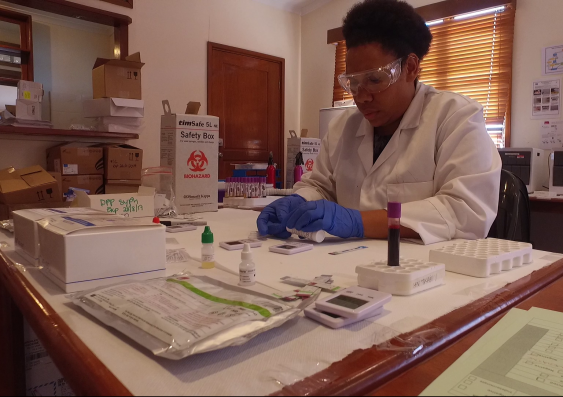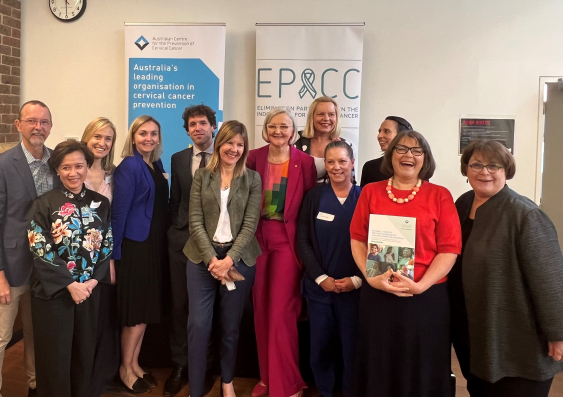New funding to support HIV research in Papua New Guinea
2024-02-23T09:56:00+11:00

The Kirby Institute’s Scientia Associate Professor Angela Kelly-Hanku (second from right) and ACT-UP PNG colleagues.
Photo: Papua New Guinea Institute for Medical Research.
The $5 million grant co-led by the Kirby Institute and the Papua New Guinea Institute of Medical Research will improve the lives of people living with HIV.В
The Kirby Institute at БсБ«№ЩНш Sydney has been awarded $5 million from the Australian Government for point-of-care testing and drug resistance surveillance for HIV in Papua New Guinea (PNG).
The funding will support the next phase of the ACTUP-PNG project, which is contributing to a more resilient and equitable public health system in PNG, through strengthened laboratory and public health workforce capacity building, HIV drug resistance surveillance, and implementation science research.
Announced this week by Penny Wong, Minister for Foreign Affairs and Trade, and Pat Conroy, Minister for International Development and the Pacific, the funding will allow the continuation and expansion of the highly impactful initiative, a partnership between the Kirby Institute, the PNGIMR, PNG National Department of Health, Western Highlands Provincial Health Authority, Port Moresby General Hospital and the civil society organisation, Key Population Advocacy Consortium.
The Kirby Institute’s Scientia Associate Professor Angela Kelly-Hanku, group lead, Global Health Equity and Justice Group and Senior Principal Research Fellow at the PMGIMR, is leading this grant.
“This funding recognises the valuable contribution that ACTUP has made in PNG’s national HIV response across a number of grounds including laboratory and public health capacity building, HIV service delivery, drug resistance surveillance and maternal and child health,” she says.
With this new funding ACTUP-PNG will also be able to support improvements in PNG’s efforts to prevent mother-to-child transmission of syphilis and hepatitis B with particular focus on increasing hepatitis B virus birth-dose vaccination of newborns, which remains very low.
“Papua New Guinea has the highest burden of HIV in the Pacific region, and HIV drug resistance remains an ongoing concern given high rates of stigma and other issues that affect people’s adherence to life-long treatment,” says Dr Janet Gare, head of Disease Surveillance at PNGIMR and ACTUP-PNG co-lead.
“We welcome this continued funding, which will enable the ongoing provision of point-of-care infant diagnosis and HIV viral load testing, including of pregnant women living with HIV to help prevent transmission of the virus to their baby, in Mount Hagen and Port Moresby, as well as HIV drug resistance surveillance.
“ACTUP-PNG will enhance capacity for integrated antenatal and paediatric care, as well as address current gender, disability and social inclusion inequities.”
Media enquiries
For inquiries about this story and interview requests please contact Lucienne Bamford
Tel: 0432 894 029
·ЎіѕІ№ѕ±±ф:Мэ






